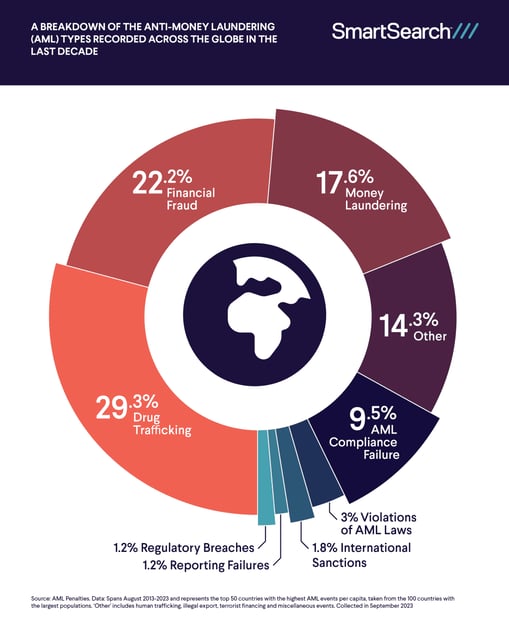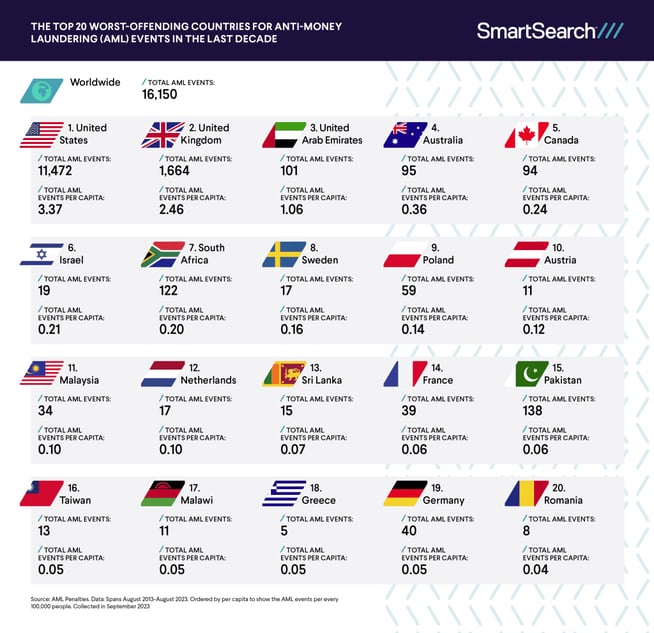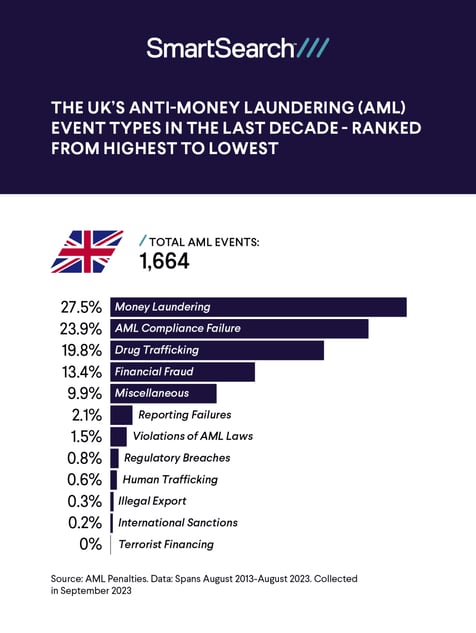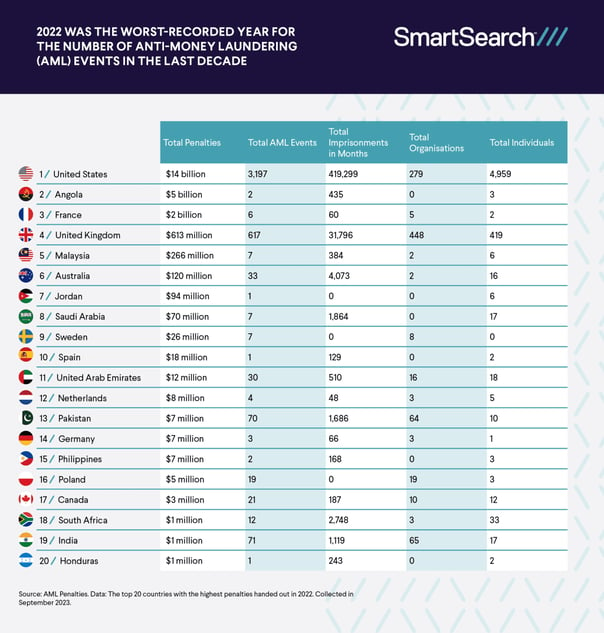2024 Money Laundering and Financial Crime Report
SmartSearch
The state of money-laundering related crimes and compliance failure issues across the globe
Money laundering refers to the process criminals use to disguise illegally obtained funds as legitimate income.
We’ve listed the countries with the highest rates of AML events per capita, a detailed breakdown of activities in the UK and US, and taken a closer look at the financial penalties issued in 2022 - the worst-recorded year for AML events across the globe.
In this report, data has been sourced from the AML Penalties tool - it’s the most comprehensive money laundering events-based data platform, built for AML and financial crimes compliance professionals, organisations and regulators.
While not every event will be recorded on the platform, by analysing the ones that are there, provides a comprehensive picture of the activities and events in each country and the effects they’re having on the world.


A quick summary of our anti-money laundering event data from 2013-2023:
-
Between August 2013 and August 2023, there were 16,150 AML events recorded on the platform across the globe
-
Across the world, drug trafficking is the most prevalent AML event at 29.3%, closely followed by financial fraud (22.2%) and money laundering (17.6%)
-
Almost 10% of all AML events that have occurred across the globe are AML compliance failures
-
The US tops the list of the top 20 worst-offending countries for AML events per capita and overall by a country mile, followed by the UK, United Arab Emirates, Australia and Canada
-
Money laundering is the most common AML event in the UK (27.5%), followed by AML compliance failures (23.9%)In the US, it’s drug trafficking (35.9%) followed by financial fraud (25.9%)
-
2022 was the worst-recorded year for AML events - we’ve shared the amounts of penalties issued and imprisonments (months) handed out, plus the number of organisations and individuals involved
-
The US has the highest total of penalties handed out in 2022 ($14bn), followed by France with $2bn, even though this country is number 14 in the worst-offender list

Anti-money laundering events across the globe
Between August 2013 and August 2023, there were 16,150 AML events recorded on AML Penalties across the globe. Here, they’re broken down by AML event types.
Drug trafficking was the highest recorded event, making up almost a third of all AML events (29.3%), followed by financial fraud (22.2%) and money laundering (17.6%).
The true nature of the drug trafficking problem across the globe is hard to understand, due to the fact that much of its activity is hidden. It’s influenced by geography, socio-economic factors, and law enforcement efforts - and often involves large criminal networks.

The top 20 worst-offending countries for AML events in the last decade
The US was found to have the highest number of AML events across the globe per capita. With more than 11,472 events, that's almost 3.5 events per every 100,000 people. Of the top 10 countries with the highest AML events per capita, the US holds 84% of the total.
In the UK, the second worst-offending country, there were 1,664 recorded events - almost 2.5 events per every 100,000 people. With masses of data for these two countries, we take a deeper dive into their breakdown of AML events further down in this report.

A breakdown of the crimes and AML events in these countries
In red, we’ve highlighted each country’s top AML event. Some events relate to activities carried out by individuals or groups, while others are business failures, like violations of AML laws.
The data shows money laundering is the most common top AML event overall, in eight out of 20 countries - the UK, South Africa, Austria, Malaysia, The Netherlands, Taiwan, Malawi and Romania.
In the UK, more than three quarters of its AML events relate specifically to money laundering, which shows the nation has a long way to go in stamping it out.
Other countries presenting with high percentages of money laundering as per the number of events recorded on the platform include Greece, France, and Australia.
Bespoke packages to suit your business
We can create a tailor-made package to fit your needs and budget without compromising on functionality and service to ensure our unique AML solution is affordable to all businesses.
AML Compliance Failure
Sweden notably has the highest figure (69%), with almost three-quarters of its total AML events relating to this issue. Other countries with this as its top AML event include the UAE, Canada, Israel, France and Taiwan.
But it’s worth pointing out that while some countries have other AML events as their top crime or issue, they’re still struggling with compliance failure. For example, Sri Lanka presents as struggling the most with regulatory breaches (46.7%) but it still has 33.3% under compliance failure.
Other countries with AML compliance failure making up more than 20% of their AML events include Malaysia, Poland, the UK, Pakistan and Austria.
Non-compliance can lead to hefty penalties, legal consequences, and reputational damage - plus a loss of trust from regulatory bodies and authorities, which may increase scrutiny and monitoring or impose stricter reporting requirements, audits, and inspections.






The UK
While there are disparities in population size, laws and so on, it’s interesting that although both countries share drug trafficking, money laundering and financial fraud as top AML events - in the UK AML compliance failure has been a far greater issue than in the US in the last decade.
This might be why AML compliance has been at the top of the Financial Conduct Authority’s agenda in 2023 - and rightly so. Some eye-watering fines have been issued across the nation as it cracks down on the stubborn issue.
AML compliance is important in many industries, with many common mistakes to avoid, but our research into compliance in the emerging financial sectors - banking, crypto, property development and gaming, showed some worrying trends.
One third of these firms freely admit they would need more than a week to compile a compliance audit, if they found themselves under investigation.
The US
In the US, drug trafficking accounted for almost 36% of all its AML events (11,472). It’s a complex problem influenced by law enforcement efforts, border control challenges, organised crime, global drug trade networks, corruption, ineffective drug policies, high demand and more.
According to the United States Sentencing Commission, of the 20,037 cases reported to them involving drugs in the fiscal year 2022, 19,851 involved drug trafficking specifically, with methamphetamine making up almost half (48.8%) of the primary drug type distributed.
These drug traffickers will be hiding their money by utilising shell companies, bulk cash smuggling, trade-based money laundering, cryptocurrencies, cash-intensive businesses like casinos, offshore accounts and tax havens, and through real estate transactions - all of which pose a wider threat to the US economy.
The US shares borders with countries that are known for drug production, like Colombia and Mexico, which contributes to the problem. Opioid addictions have reached critical levels in the US and the country’s drug problem is having a significant impact on the healthcare system.


2022 was the worst-recorded year for AML events in the last decade
The data shows us that more than a quarter of all AML events recorded on the platform occurred in 2022 (4,363 out of 16,150).
This table shows the top 20 countries with the highest AML events in 2022 alone, ordered by the penalties they issued. Unsurprisingly, the US issued the most penalties overall, with $14bn across 3,197 AML events.
Those 3,197 events were spread across 279 organisations and almost 5,000 individuals, which implies that in many of the AML events in the US, multiple people from each organisation were involved. This is a stark contrast to the UK, in which the figures for organisations (448) and individuals (419) are far more equal.
This could indicate that organised crime involving groups is more common in the US. Notably, France appears to be particularly hot on penalties.
Top AML red flags businesses should look out for
Here are the top AML red flags businesses should be looking out for.
The sheer scale of money laundering is difficult to assess, but it is reported by the United Nations Office on Drugs and Crime that between two and five per cent of global GDP is laundered each year, which is between €715 billion and €1.87 trillion each year.
AML events is the phrase used to describe the collective of these crimes and issues: drug trafficking, financial fraud, money laundering, AML compliance failure, violations of AML laws, regulatory breaches, international sanctions, reporting failures, human trafficking, terrorist financing, illegal export and miscellaneous events.

Why is anti-money laundering and digital compliance important for businesses?
Any regulated business that could be vulnerable to money laundering must comply with AML regulations. As the UK’s leading digital compliance provider, our aim is to drive the digital compliance revolution with our award-winning and cloud-based platform, aiding these in the detection of criminal behaviour relating to money laundering.
Regulated sectors include: legal, accountancy, property, gaming, cryptocurrency, investment, insurance, financial services, banking and property development.
If adequate AML software or processes aren't in place to run comprehensive online AML checks, verification and monitoring, businesses may not only fall victim to money laundering and-or financial crime, but run the risk of multi-million-pound fines for non-compliance.


SmartSearch’s award-winning software: Driving the digital compliance revolution
So how can SmartSearch help businesses? With our award-winning AML software and sophisticated electronic verification platform, we ensure clients within regulated sectors such as legal, accountancy, property, financial services, gaming, cryptocurrency, investment, insurance, banking and property development stay ahead of ever-changing AML regulations - and ensure AML compliance.
Businesses can access innovative features and perform due diligence and ongoing monitoring, plus carry out the following checks: Know Your Customer (KYC), Source of Funds, sanctions, Politically Exposed Persons (PEPs), Special Interest Persons (SIPs) and Persons with Significant Control (PSCs), all in one place.
Whether a company’s prospective client is a corporation or an individual, our comprehensive AML solution covers every base, so your business is protected. We use the Dow Jones WatchList to carry out AML checks, which is updated everyday, and we’re one of the only providers in the UK to offer Triple-Bureau reliability - which is the gold standard of AML and KYC and means our software includes data from three credit reference agencies.
There are many benefits to using our system, which include instant access, expert support, AML checks wherever you are, no more manual documents, tailor-made training for your team and more.
